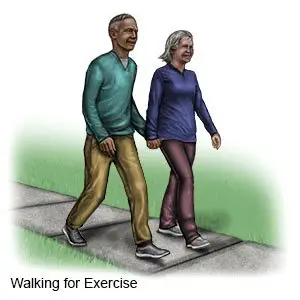What is obsessive compulsive disorder (OCD)?
OCD is an anxiety disorder that causes obsessions and compulsions. An obsession is an unwanted thought that stays in your mind most of the time. You cannot stop or control this thought. A compulsion is something you do and cannot stop doing because of the obsessive thought. You may become very anxious if you try to stop the compulsion.
What causes or increases my risk for OCD?
The exact cause of OCD is unknown. Any of the following may increase your risk:
- Changes in brain chemicals that affect your mood
- A family history of OCD or anxiety disorders
- A head injury or brain injury
- Stressful events, such as the death of a loved one or job change
What are the signs and symptoms of OCD?
The signs of OCD may be worse during times of stress. You may have any of the following:
- Repeated thoughts that you cannot control, such as a fear of dirt, germs, or intruders
- A behavior that you cannot stop, such as washing your hands over and over
- An obsession or compulsion about keeping your body or everything around you clean
- The urge to check many times to see if your doors are locked or stove is off
- Feeling that what you are thinking and doing is wrong but still needing to do it
- A need to hide your thoughts or behaviors
- Thoughts and behaviors prevent you from being able to do your daily activities.
How is OCD diagnosed and treated?
Your healthcare provider will ask you several questions about your thoughts and behaviors. Treatment may include any of the following:
- Medicines , such as antidepressants, may be given to treat the symptoms of OCD. You may need to take this medicine for several weeks before you begin to feel better. Tell your healthcare provider about any side effects or problems you have with your medicine. Sometimes the type or amount of medicine may need to be changed. Other medicines may also be given.
- Therapy may be used to treat your OCD. A therapist will help you learn to cope with your thoughts and feelings. This can be done alone or in a group. It may also be done with family members or a significant other.
Treatment options
The following list of medications are in some way related to or used in the treatment of this condition.
- Zoloft
- Prozac
- Anafranil
- sertraline
- Paxil
View more treatment options
What can I do to manage OCD?
- Limit or do not drink alcohol. Alcohol can increase anxiety and depression. Alcohol can also make it harder to sleep well. If you choose to drink, ask your healthcare provider how much alcohol is okay for you to drink. A drink of alcohol is 12 ounces of beer, 5 ounces of wine, or 1½ ounces of liquor.
- Get regular physical activity. Exercise can help decrease stress and anxiety. Talk to your healthcare provider before you start to exercise. Together you can plan the best exercise plan for you.

- Get regular sleep. Try to sleep 6 to 8 hours each night. Sleep can help lower stress.
When should I seek immediate care?
- You think about harming yourself or someone else.
When should I call my doctor?
- You are not able to sleep well or are sleeping more than usual.
- You cannot eat or are eating more than usual.
- You cannot make it to your next appointment.
- You have questions or concerns about your condition or care.
Care Agreement
You have the right to help plan your care. Learn about your health condition and how it may be treated. Discuss treatment options with your healthcare providers to decide what care you want to receive. You always have the right to refuse treatment. The above information is an educational aid only. It is not intended as medical advice for individual conditions or treatments. Talk to your doctor, nurse or pharmacist before following any medical regimen to see if it is safe and effective for you.© Copyright Merative 2023 Information is for End User's use only and may not be sold, redistributed or otherwise used for commercial purposes.




